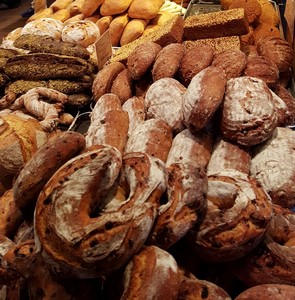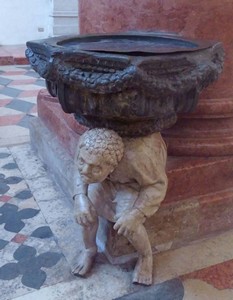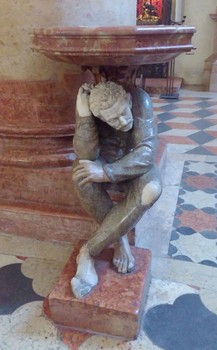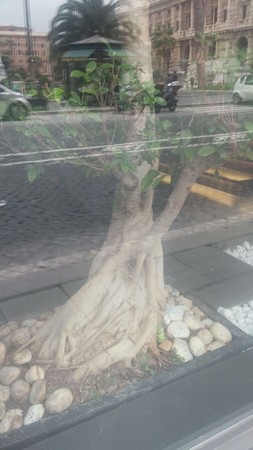stdClass Object
(
[id] => 16357
[title] => The Counter Melody of the Prophets
[alias] => the-counter-melody-of-the-prophets
[introtext] => The Voices of the Days/15 - The ways of faithfulness to the word are mysterious and uncomfortable
by Luigino Bruni
published in Avvenire on 19/06/2016
 Blessed are you when people hate you and when they exclude you and revile you and spurn your name as evil, on account of the Son of Man! ... for so their fathers did to the prophets. ... Woe to you, when all people speak well of you, for so their fathers did to the false prophets."
Blessed are you when people hate you and when they exclude you and revile you and spurn your name as evil, on account of the Son of Man! ... for so their fathers did to the prophets. ... Woe to you, when all people speak well of you, for so their fathers did to the false prophets."
Luke 6,22;26
The natural condition of the prophet is the failure. The false prophets are the ones to be heard and followed, to respond fully to the expectations of their time. Being followed, achieving fame and honours has always been a sure sign of false prophecy - and continues to be so. True prophets, however, are always out of time, uncomfortable, obnoxious, annoying.
[fulltext] => They ask for and scream about the defence of the poor, the oppressed, the widows and the orphans, they struggle against idolatry; and while they do so they still live in a society where the poor are downtrodden and exploited and the idols are multiplying. In response to their complaint they encounter persecution, stoning and are often jailed and killed. Knowing and retracing the history of the prophets of yesterday and today is a great lesson on the dynamics of power, and therefore on the nature of all ideologies which, in their essence, are instruments produced by the ruling class in order to increase power and privileges.
True prophets do not like their condition of a prophet. They do not choose it, and if they could they would do something else. But - and here is the essence of this specific vocation - they cannot choose. They cannot escape, even if they try. The prophets are neither better nor worse than all the others: they are simply different. Some have even thought, and still think, that the prophets are useless if not harmful, because their words are vanitas that does not transform the world. In the end, all they do is deceive the poor and the marginalized promising a salvation that never comes. Some, many think so. But they are wrong. All the prophets can know is the misunderstanding on the part of the people, due to their "singing" a counter melody. There is also the deliberate and intentional persecution by those who understand them very well, and so fight them. The Pharaohs and Herod recognize and know the prophets, and that's why they fear them more than anything else. But there is someone who believes and loves the prophets. They are the poor, the oppressed, the humble, those pushed to the margins, the lepers. And not just because they see the hope of redemption from their unjust condition in a prophet, but because they are in the anthropological and spiritual conditions to understand their voice. The Kingdom of Heaven is just for the "poor" and those "persecuted for righteousness' sake" because in their condition they can see, understand and desire it.
The powerful, however, are very fond of the false prophets, to the point of worshipping them. They are their flatterers and devotees, because false prophecy confuses the collective consciousness and legitimates the positions of power. Yesterday and today, the market abounds with intellectuals, writers, sometimes religious people that generate theories and ideologies for the sole purpose of justifying the power of those who support them and feed them. When it is too expensive or inconvenient to eliminate the prophets directly, the powerful do so indirectly, by hiring false prophets. They behave like the plants that defend themselves from the attacks of some insects by generating odours and other substances to attract the predatory insects of those threatening them. Therefore, the main virtue of those performing some prophetic function is resilience and stamina to persevere in the condition of frustration over their words pronounced because of their vocation not being listened to. Especially when times passes slowly, persecutions have no respite, and the prophetic word should continue to be pronounced. But why does the prophet go on saying his words if he cannot see the end of injustice or the advent of a new kingdom of the poor? Certainly not because he hopes to convert the powerful. He knows very well - or learns it as he becomes an adult - that the pharaohs are inconvertible. He doesn't even hope for revolutions of the poor, because he knows that once they become powerful, the poor of today will behave exactly like those who oppressed them yesterday. Neither are they the men and women of the reform of small steps, seeking a gradual improvement on the level of what's possible, here and now. This reformist vision, which is just as important and co-essential, is that of the (good) institutions, not of the prophets. What they announce is too different from the status quo, and no marginal improvement could adequately respond to their prophecy. They are eternally dissatisfied. Because what they announce is a reign that's too righteous, a God who is too close, man who is too different. But prophecy is not to be confused with utopia, because unlike the utopian word (which is often produced to distract us from that of the prophets), the prophetic statement is always concrete. It calls people by their name; it takes specific actions and makes visible gestures using the "jars" and the "yokes" of all. It is an "already" that indicates a "not yet". For this reason the word of the prophets is always betrayed the promised land is never reached, and their existence is marked by a constant and growing feeling of certainty of failure and suffering.
To truly understand that happiness is not the most important thing in life, we must get to know the prophets. A prophet is not happy, simply because happiness does not interest him. He would not understand or know how to answer the question: "Are you happy?" He only wants to remain a "voice crying in the wilderness", without waiting or even hoping to see the desert flourished. True prophets always cry in the desert, and the much heat and thirst cannot silence their voices. And when they see some signs of spring, they wonder whether those shoots are anything but a sign that their voice has lost truth and prophecy. So why does the prophet continue to talk, to cry, to lose his health, well-being and not infrequently even his life? Simply because he cannot help to do it. He is inhabited by a mystery that he does not possess, does not know, and one that does not obey him. But if he does not give voice to that voice, he will really die. This is the sad and wonderful destiny of the prophets. The wonderful story of Jonah, the radical simplicity of his unique and paradoxical literary genre is among the most revealing of the essence of this dimension of the prophetic vocation (the dimensions of the prophetic vocation are many, and it is not easy to break them down to units). Jonah, as often happens to the prophets (Moses, Jeremiah, Elijah ...), does not respond to the call immediately. When Jonah receives the first call to prophesise in Nineveh, he escapes and embarks on a ship going in the opposite direction. After being miraculously saved from the wreck (thanks to the fish), he answers the second call of YHWH and brings his message to the big city: "Yet forty days, and Nineveh shall be overthrown!" (3,4). And, as an exceptional event, the city of Nineveh and its king repent, and convert fully and immediately. Having observed this conversion, God changes his mind and does not destroy Nineveh, acting differently from what he had said through Jonah. No prophet is master of the word that he has to announce due to his call. He knows that God cannot be caged either by the prophecy that He himself puts on the lips of the prophets.
The most mysterious aspect of the story of Jonah is his disappointment and anger about God's repentance: “But it displeased Jonah exceedingly, and he was angry. And he prayed to the Lord and said, »O Lord, is not this what I said when I was yet in my country? That is why I made haste to flee to Tarshish; for I knew that you are a gracious God and merciful, slow to anger and abounding in steadfast love, and relenting from disaster. Therefore now, O Lord, please take my life from me, for it is better for me to die than to live.«” (4,1-3) This pain and indignation of Jonah can tell us something very important. Prophets are the great lovers of the word. Because of this, they are its custodians. Like women and mothers are experts and guardians of the body, so are prophets of the word. They live only for this, they cannot do anything else. But they are not only lovers and guardians of the words they say: they are also their great defenders. Against men, but, says Jonah, they are defenders of the word even against YHWH. Since they are not its masters, they can be - and are - its protectors. More of an artist who keeps his work, the first task of the prophet is to protect the word, even if its sender change their mind. If he didn't do so, the word he is announcing would soon get worn out and empty. The prophets can defend the word of God from God himself. The word is always a very serious matter: prophets have the task to remind everyone, even God of this, knowing that they will not be heard. If the prophets did not love the word they are announcing more than themselves, they would be false prophets, journeymen of words that they only sell and do not serve. The paradox of the end of the story of Jonah opens up to us only if we take prophecy radically seriously and don't transform it into a merely ethical or religious matter. Faithfulness to the word of God is more radical for the prophet than obedience to God himself. It is in this paradoxical obedience-faithfulness that the true prophet is truly faithful.
Whoever has had a task in life, while unwinding it responsibly, can sense this mysterious and paradoxical dimension of every vocation. Their most valuable and crucial moments were those when they had to protect that task and that work precisely against those who had entrusted it to them. To keep believing even when the one who had "called" them no longer spoke, or had changed his mind. It is on this tremendous and wonderful faithfulness that you play a lot of the truth of an entire existence. It is also because of this strange faithfulness that it is not easy to understand the prophets. But it is not impossible. We must at least try. And so, after having commented on Genesis, Exodus, Job, and Ecclesiastes during the recent years, next Sunday we will begin to get to know the first writer prophet, perhaps the greatest of all: Isaiah. A new journey will begin that's unpredictable now, but certainly fantastic. Together.
download article in pdf
[checked_out] => 0
[checked_out_time] => 0000-00-00 00:00:00
[catid] => 757
[created] => 2016-06-18 19:00:00
[created_by] => 64
[created_by_alias] =>
[state] => 1
[modified] => 2020-08-10 04:41:47
[modified_by] => 609
[modified_by_name] => Super User
[publish_up] => 2016-06-18 22:15:00
[publish_down] => 0000-00-00 00:00:00
[images] => {"image_intro":"","float_intro":"","image_intro_alt":"","image_intro_caption":"","image_fulltext":"","float_fulltext":"","image_fulltext_alt":"","image_fulltext_caption":""}
[urls] => {"urla":false,"urlatext":"","targeta":"","urlb":false,"urlbtext":"","targetb":"","urlc":false,"urlctext":"","targetc":""}
[attribs] => {"show_title":"","link_titles":"","show_tags":"","show_intro":"","info_block_position":"","show_category":"","link_category":"","show_parent_category":"","link_parent_category":"","show_author":"","link_author":"","show_create_date":"","show_modify_date":"","show_publish_date":"","show_item_navigation":"","show_icons":"","show_print_icon":"","show_email_icon":"","show_vote":"","show_hits":"","show_noauth":"","urls_position":"","alternative_readmore":"","article_layout":"","show_publishing_options":"","show_article_options":"","show_urls_images_backend":"","show_urls_images_frontend":""}
[metadata] => {"robots":"","author":"","rights":"","xreference":""}
[metakey] =>
[metadesc] => The prophets do not seek success. They cannot hope for the conversion of the pharaohs. They are the guardians and defenders of the word against everyone. Even against God, as the paradox of Jonah's story tells us.
[access] => 1
[hits] => 3377
[xreference] =>
[featured] => 0
[language] => en-GB
[on_img_default] =>
[readmore] => 10229
[ordering] => 1
[category_title] => EN - The Voices of the Days
[category_route] => organizzazioni-e-ideali/it-le-voci-dei-giorni
[category_access] => 1
[category_alias] => en-the-voices-of-the-days
[published] => 1
[parents_published] => 1
[lft] => 154
[author] => Antonella Ferrucci
[author_email] => ferrucci.anto@gmail.com
[parent_title] => Organizzazioni e Ideali
[parent_id] => 1028
[parent_route] => organizzazioni-e-ideali
[parent_alias] => organizzazioni-e-ideali
[rating] => 0
[rating_count] => 0
[alternative_readmore] =>
[layout] =>
[params] => Joomla\Registry\Registry Object
(
[data:protected] => stdClass Object
(
[article_layout] => _:default
[show_title] => 1
[link_titles] => 1
[show_intro] => 1
[info_block_position] => 0
[info_block_show_title] => 1
[show_category] => 1
[link_category] => 1
[show_parent_category] => 1
[link_parent_category] => 1
[show_associations] => 0
[flags] => 1
[show_author] => 0
[link_author] => 0
[show_create_date] => 1
[show_modify_date] => 0
[show_publish_date] => 1
[show_item_navigation] => 1
[show_vote] => 0
[show_readmore] => 0
[show_readmore_title] => 0
[readmore_limit] => 100
[show_tags] => 1
[show_icons] => 1
[show_print_icon] => 1
[show_email_icon] => 1
[show_hits] => 0
[record_hits] => 1
[show_noauth] => 0
[urls_position] => 1
[captcha] =>
[show_publishing_options] => 1
[show_article_options] => 1
[save_history] => 1
[history_limit] => 10
[show_urls_images_frontend] => 0
[show_urls_images_backend] => 1
[targeta] => 0
[targetb] => 0
[targetc] => 0
[float_intro] => left
[float_fulltext] => left
[category_layout] => _:blog
[show_category_heading_title_text] => 0
[show_category_title] => 0
[show_description] => 0
[show_description_image] => 0
[maxLevel] => 0
[show_empty_categories] => 0
[show_no_articles] => 1
[show_subcat_desc] => 0
[show_cat_num_articles] => 0
[show_cat_tags] => 1
[show_base_description] => 1
[maxLevelcat] => -1
[show_empty_categories_cat] => 0
[show_subcat_desc_cat] => 0
[show_cat_num_articles_cat] => 0
[num_leading_articles] => 0
[num_intro_articles] => 14
[num_columns] => 2
[num_links] => 0
[multi_column_order] => 1
[show_subcategory_content] => -1
[show_pagination_limit] => 1
[filter_field] => hide
[show_headings] => 1
[list_show_date] => 0
[date_format] =>
[list_show_hits] => 1
[list_show_author] => 1
[list_show_votes] => 0
[list_show_ratings] => 0
[orderby_pri] => none
[orderby_sec] => rdate
[order_date] => published
[show_pagination] => 2
[show_pagination_results] => 1
[show_featured] => show
[show_feed_link] => 1
[feed_summary] => 0
[feed_show_readmore] => 0
[sef_advanced] => 1
[sef_ids] => 1
[custom_fields_enable] => 1
[show_page_heading] => 0
[layout_type] => blog
[menu_text] => 1
[menu_show] => 1
[secure] => 0
[helixultimatemenulayout] => {"width":600,"menualign":"right","megamenu":0,"showtitle":1,"faicon":"","customclass":"","dropdown":"right","badge":"","badge_position":"","badge_bg_color":"","badge_text_color":"","layout":[]}
[helixultimate_enable_page_title] => 1
[helixultimate_page_title_alt] => The Voices of the Days
[helixultimate_page_subtitle] => Organizzazioni e Ideali
[helixultimate_page_title_heading] => h2
[page_title] => The Voices of the Days
[page_description] =>
[page_rights] =>
[robots] =>
[access-view] => 1
)
[initialized:protected] => 1
[separator] => .
)
[displayDate] => 2016-06-18 19:00:00
[tags] => Joomla\CMS\Helper\TagsHelper Object
(
[tagsChanged:protected] =>
[replaceTags:protected] =>
[typeAlias] =>
[itemTags] => Array
(
)
)
[slug] => 16357:the-counter-melody-of-the-prophets
[parent_slug] => 1028:organizzazioni-e-ideali
[catslug] => 757:en-the-voices-of-the-days
[event] => stdClass Object
(
[afterDisplayTitle] =>
[beforeDisplayContent] =>
[afterDisplayContent] =>
)
[text] => The Voices of the Days/15 - The ways of faithfulness to the word are mysterious and uncomfortable
by Luigino Bruni
published in Avvenire on 19/06/2016
 Blessed are you when people hate you and when they exclude you and revile you and spurn your name as evil, on account of the Son of Man! ... for so their fathers did to the prophets. ... Woe to you, when all people speak well of you, for so their fathers did to the false prophets."
Blessed are you when people hate you and when they exclude you and revile you and spurn your name as evil, on account of the Son of Man! ... for so their fathers did to the prophets. ... Woe to you, when all people speak well of you, for so their fathers did to the false prophets."
Luke 6,22;26
The natural condition of the prophet is the failure. The false prophets are the ones to be heard and followed, to respond fully to the expectations of their time. Being followed, achieving fame and honours has always been a sure sign of false prophecy - and continues to be so. True prophets, however, are always out of time, uncomfortable, obnoxious, annoying.
[jcfields] => Array
(
)
[type] => intro
[oddeven] => item-odd
)








 “Once married you are punished by never feeling any kind of sweetness apart from what belongs to all.” (rough translation from the Italian original)
“Once married you are punished by never feeling any kind of sweetness apart from what belongs to all.” (rough translation from the Italian original) “Save me, oh, Lord, from many words”
“Save me, oh, Lord, from many words” “Indeed, the tension of existence and the spur that moves us from the deep to live it reside in the fact that every stage of life is new, and had never happened before, and is unique, and then goes for ever”. As soon as you no longer feel the spur to live life, a feeling of monotony comes that can even grow to despair "
“Indeed, the tension of existence and the spur that moves us from the deep to live it reside in the fact that every stage of life is new, and had never happened before, and is unique, and then goes for ever”. As soon as you no longer feel the spur to live life, a feeling of monotony comes that can even grow to despair " “Ripeness is all.”
“Ripeness is all.” “What needs to be there in the heart, in education is that love of life should never fail our children. ... And what is a human being's vocation but the highest expression of his love of life?”
“What needs to be there in the heart, in education is that love of life should never fail our children. ... And what is a human being's vocation but the highest expression of his love of life?” “(There is a kind of) human worth that is inseparable from vulnerability, an excellence that is in its nature other-related and social, a rationality whose nature it is not to attempt to seize, hold, trap, and control, in whose values openness, receptivity and wonder play an important part.”
“(There is a kind of) human worth that is inseparable from vulnerability, an excellence that is in its nature other-related and social, a rationality whose nature it is not to attempt to seize, hold, trap, and control, in whose values openness, receptivity and wonder play an important part.” "Serious and terrible mistake it was, the invention of the crosses.”
"Serious and terrible mistake it was, the invention of the crosses.” "There are qualities or instances of excellence that the I cannot attribute to itself alone: purity, charm, modesty, humour, all the perfections that disappear if only we touch them, even if for just a moment, because they cannot exist except as unaware of themselves. In other words, it is never the same subject to be it and to say it."
"There are qualities or instances of excellence that the I cannot attribute to itself alone: purity, charm, modesty, humour, all the perfections that disappear if only we touch them, even if for just a moment, because they cannot exist except as unaware of themselves. In other words, it is never the same subject to be it and to say it." "A community is never founded once and for all. The first founder cannot be the one and only point of reference. Society's needs change; communities evolve; their members grow. They need to be constantly 're-founded'. The founding myth remains but the form in which it is embodied is called to change. It is here that the presence of wise 're-formers' is required. They are capable of advancing, maintaining and deepening the founding myth, pruning and reshaping what seemed essential in the early years but was not really."
"A community is never founded once and for all. The first founder cannot be the one and only point of reference. Society's needs change; communities evolve; their members grow. They need to be constantly 're-founded'. The founding myth remains but the form in which it is embodied is called to change. It is here that the presence of wise 're-formers' is required. They are capable of advancing, maintaining and deepening the founding myth, pruning and reshaping what seemed essential in the early years but was not really." ‘Master, did you not sow good seed in your field? How then does it have weeds?’ He said to them, ‘An enemy has done this.’ So the servants said to him, ‘Then do you want us to go and gather them?’ But he said, ‘No, lest in gathering the weeds you root up the wheat along with them. Let both grow together until the harvest’.
‘Master, did you not sow good seed in your field? How then does it have weeds?’ He said to them, ‘An enemy has done this.’ So the servants said to him, ‘Then do you want us to go and gather them?’ But he said, ‘No, lest in gathering the weeds you root up the wheat along with them. Let both grow together until the harvest’. Here, in the best and most vital moments, people feel free to donate goods and wealth along with their 'ills' and poverty. When, however, communities and their spirit fade away, the goods donated together in response to requests for help diminish, too, even if we often do not notice or think that reducing poverty is actually the result of the increase of goods and wealth. A community is reborn when its members begin to give (share) goods together with their many instances of poverty and pain.
Here, in the best and most vital moments, people feel free to donate goods and wealth along with their 'ills' and poverty. When, however, communities and their spirit fade away, the goods donated together in response to requests for help diminish, too, even if we often do not notice or think that reducing poverty is actually the result of the increase of goods and wealth. A community is reborn when its members begin to give (share) goods together with their many instances of poverty and pain. are still very concentrated in just a few hands. Ownership and therefore the distribution of wealth will be the challenges of the new plant-like capitalism, issues about which we cannot say hardly anything today, because we continue to think of them along the categories of the twentieth century (entrusting all to policy and / or taxes alone). Until we begin to think of new forms of property spread out in the new forests, we will continue to imitate plants but remain predators.
are still very concentrated in just a few hands. Ownership and therefore the distribution of wealth will be the challenges of the new plant-like capitalism, issues about which we cannot say hardly anything today, because we continue to think of them along the categories of the twentieth century (entrusting all to policy and / or taxes alone). Until we begin to think of new forms of property spread out in the new forests, we will continue to imitate plants but remain predators.